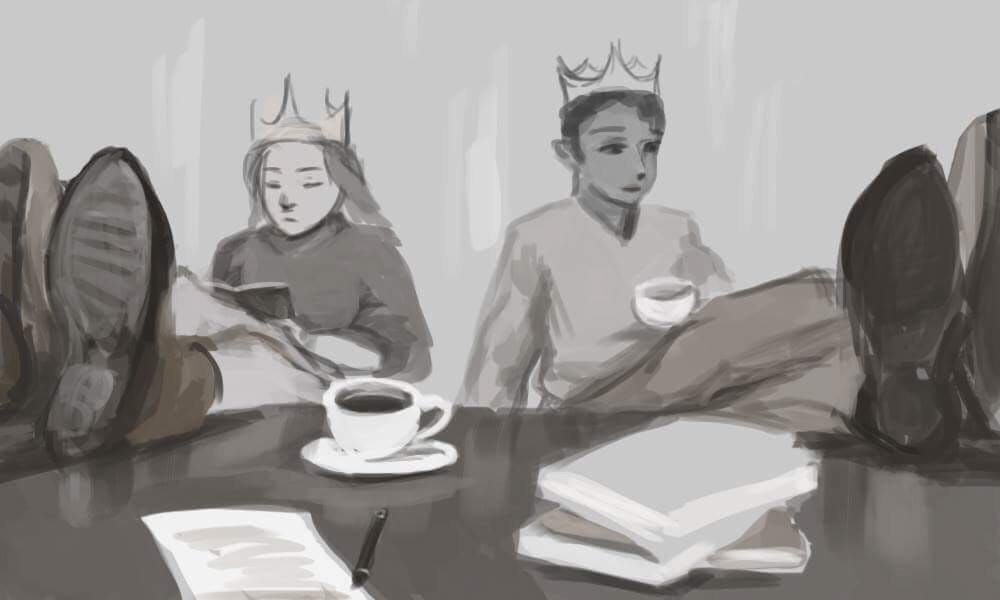
“I’ve been coming to this cafe for 20 years!”
The man’s face, burning bright and belligerent, looked down at me as my roommate and I attempted to sit at a table, rightfully claimed by us. When we noticed through the window of the La Colombe in Rittenhouse Square that a group of three or four people were vacating a coveted circular table, we rushed briskly to the entrance. Specifically holding the door for them to leave, we hurried through the entryway after their departure, happily slapping our backpacks down on the empty table.
The altercation that thus ensued between a middle-aged man and us college-aged kids displays a blatant and pressing problem as an avid coffee addict — the unspoken culture of coffee shops. Am I being dramatic? Possibly. Does this discount the necessary conversation about the construct of seniority not being a valid argument in public spaces? Not at all.
“I’ve been watching this table for 15 minutes,” the man in his mid-40s said, approaching us with an air of distrust and entitlement. Flabbergasted, we had no idea how to respond to that except by saying, “… OK?”
Eventually, we vacated the table in favor of a smaller one near the back of the shop, allowing the man what he perceived to be his “rightful” table. We did this for the sake of other customers in the cafe, who were beginning to land questioning glances and annoyed side-eyes to my quickly reddening face. I was shocked that in a city so large, with so many coffee shops, this man still thought he lauded some sort of authority over the seating arrangement simply due to age and history, as if coffee shops everywhere abided by this principle.

CC0
I prefer to do homework in coffee shops. I like the white noise of clinking cups and various chatter, and it gets me off campus for a few hours. I see it as a welcome relief from the plug-and-chug library life; a place where I can sit and enjoy a coffee and my reading. Getting off campus can welcome a new thought experience and give you a new space to think through your work. People like the man I described above think they have a monopoly over those social spaces because of how long they’ve been coming to said space. This is unfair — plain and simple.
Whether you’re from the city of Philadelphia, like my roommate, or from a random city in Florida, like myself, you deserve to sit at a table you’ve rightfully claimed. I haven’t even been alive for 20 years, but that doesn't mean the 20 years this man has been spending within the walls of this La Colombe means he has richer rights to it than I do.
Do you think it’s right for a lesser employee to receive a promotion ahead of a newer employee who works harder and is better at their job? Do you think age implies a larger claim over your basic rights as a citizen? You see, this assumption that seniority means a higher degree of entitlement needs to be clipped before it has larger societal implications.
Seniority has a pervasive influence on Penn campus as well. Leadership positions in clubs are typically “reserved” for upperclassmen, despite the fact that freshmen could be the best fit for the job. I’ve been particularly spoiled by my writing classes, where every student is treated the same regardless of what grade they’re in. Half the time I don’t even know what year my classmates are in.
Coffee shops, to me, are sacred spaces. So old white men who aren’t fast enough to get to the table that they had supposedly been eyeing for 20 minutes don’t get to insert their privilege in that sacred space, and certainly not on the grounds of their adulthood or seniority. I pay for my coffee just like him, and my money is as valuable despite me only coming to that shop for the past few years. My time is just as valuable, and my need for a table just as valid, regardless of our age difference.
Dramatic? Maybe. Correct? Hell yes.

SOPHIA DUROSE is a College sophomore from Orlando, Fla. studying English. Her email is sdurose@sas.upenn.edu.
The Daily Pennsylvanian is an independent, student-run newspaper. Please consider making a donation to support the coverage that shapes the University. Your generosity ensures a future of strong journalism at Penn.
Donate







